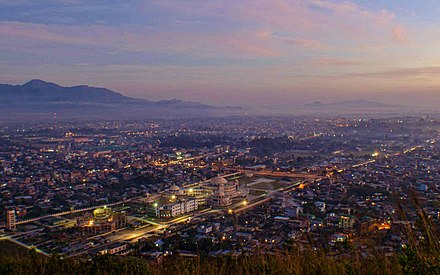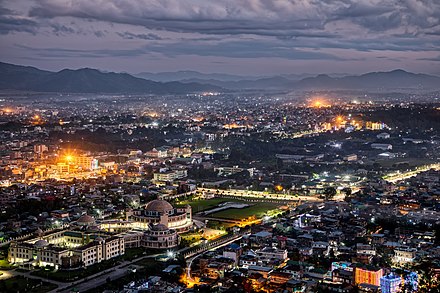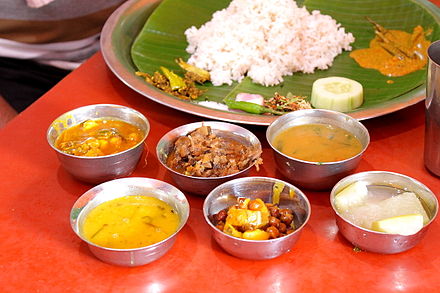Imphal - capital of the Indian state of Manipur
 Imphal (Meitei language: ꯏꯝꯐꯥꯜ, /eem-phaal/) is the capital city of the northeast Indian state of Manipur. It has a small population but it is a developed city that many travellers visit in transit. Imphal hosts the world's oldest Polo Ground (Imphal Polo Ground), the world's tallest topiary plant (Samban Lei Sekpil), the world's only women-run market (Ima Keithel) and the world's tallest polo player statue (Marjing Polo Statue).
Imphal (Meitei language: ꯏꯝꯐꯥꯜ, /eem-phaal/) is the capital city of the northeast Indian state of Manipur. It has a small population but it is a developed city that many travellers visit in transit. Imphal hosts the world's oldest Polo Ground (Imphal Polo Ground), the world's tallest topiary plant (Samban Lei Sekpil), the world's only women-run market (Ima Keithel) and the world's tallest polo player statue (Marjing Polo Statue).
In the heart of Imphal, Kangla, the ancient fortified capital of the different ruling dynasties of Ancient Kangleipak (predecessor of Manipur), is located, at whose eastern side the Imphal River flows, dividing the city into two districts as Imphal East district and Imphal West district.
Imphal was the site of a large battle during the attempted Japanese invasion of India in 1944. Despite its small population, Imphal is considered by some to be the most important city in eastern India.
Understand
With an average elevation of nearly 800 m, Imphal has a cooler and more pleasant climate than most places of India. It can drop below freezing in the winter. The summers are much wetter and more humid with the monsoon rains at their peak in June and July. October is an ideal time to visit as the rains turn the whole town a lush green.
Some tourists pass straight through but it's worth staying a day, if only to see Kangla fort, buy supplies and recover from long bus rides.
World War II
See also: World War II
In 2013, the British National Army Museum voted the Battle of Imphal and the Battle of Kohima together to be "Britain's Greatest Battle" or "UK's Greatest Battle".
Talk
Meitei (officially known as Manipuri) is the official language and the principal native language of the vast majority of the population in the city. However, an English speaking visitor will not encounter much language problems. English is the second most widely studied and understood language after Meitei. At least some basic knowledge of English can be expected from almost most of the people in the tourism and public transport sectors. At the same time, learning a few Meitei language terms, like "hi", "hello", "thank you", will be helpful and appreciated.
Get in
 Imphal city is one of the most important cities in India, and is to be the most important city in eastern side of India, as the "Imphal-Mandalay-Bangkok" Route of 1,813 km is being constructed to enable India trade (focusing on Imphal) with Myanmar (focusing on Mandalay), Thailand (focusing on Bangkok) and other ASEAN nations.
Imphal city is one of the most important cities in India, and is to be the most important city in eastern side of India, as the "Imphal-Mandalay-Bangkok" Route of 1,813 km is being constructed to enable India trade (focusing on Imphal) with Myanmar (focusing on Mandalay), Thailand (focusing on Bangkok) and other ASEAN nations.
By plane

Imphal is connected to Delhi, Hyderabad, Bangalore, Mumbai, Kolkata, Aizwal, Dimapur and Guwahati by Air India, Indigo and AirAsia. Imphal International Airport (also known as "Bir Tikendrajit International Airport") is the second largest and the third busiest international airport in Northeastern India. Flights to Bangkok (IATA: BKK) seem to all go via Kolkata (IATA: CCU).
Several airlines transport passengers to and from Imphal and other places. AirAsia India serves transportation to Delhi, Guwahati and Kolkata. Air India serves transportation to Aizawl, Delhi, Dimapur, Guwahati and Kolkata. Alliance Air serves transportation to Dimapur and Guwahati. IndiGo serves transportation to Agartala, Ahmedabad, Bangalore, Delhi, Dibrugarh, Guwahati, Hyderabad, Mumbai, Kolkata and Shillong.
- Imphal Airport. 2022-07-09
By train
Imphal is not connected to India's railway network, however a new line is under construction and is expected to be completed in late 2023. The closest railway station for now is Jirbam, 80 km to the east. It's also possible to disembark at Dimapur, in Nagaland, and then continue by a 7-hour bus ride. Dimapur is a major station and sees much more traffic compared to Jirbam.
- Imphal railway station. Future railway station, expected to open in 2023. 2022-07-09
By bus
Imphal is well connected with Manipur's neighbouring states by road, on which there are many bus routes. There are daily bus services coming from and going to Kohima and Dimapur in Nagaland and Guwahati in Assam.
From specific destinations:
-
Kohima – One government bus leaves the main bus terminal in the morning, seats often sell out. If you miss the bus it's possible to take a shared or private jeep to "Mao gate" at the state boundary (maybe ₹80) and catch a second bus from Mao gate at around 11AM. If you fail to catch the second bus as well you can get from Mao gate to Senapati where more options are available.
-
Mao – It appears also shared tuk-tuks can be taken from Mao gate to Imphal directly, but this would be very uncomfortable.
-
Moreh – State buses to Imphal depart the bus yard/terminal in Moreh at 7AM, at 1PM and at 1:30PM. These times were obtained from a timetable at the Imphal bus terminal. The 6:30AM to Moreh bus usually departs at 7PM.
Get around
Minivans take common routes around the city and to neighbouring villages, tuk tuks are common and should cost ₹10-20 for short trips (though they frequently ask ₹100).
See
- INA Memorial at Moirang
- Loktak Lake, 24.55°, 93.783333°. The largest fresh water lake in North-Eastern India and has floating lake. It is also the habitat of Curvus Eldi Eldi, an endangered species found only in Manipur. Take a bus for ₹50 from the bazaar (approx one hour). There are several homestays asking around ₹1000 a night on the islands but no hotels. 2022-07-10
- Matai Garden- The garden is in Matai, Imphal east district about 5 km north on NH-39. The garden is also called Ibudhou Asheiningthou Garden, taking the name from Ibudhou Asheiningthou (local God of Matai). The garden is known for its myriad Duranta plant, well shaped and decorating the entire garden.
- Manipur State Museum, Kangla Rd (near the polo grounds), 24.8052°, 93.9372°. 10AM-4:30PM. The museum is varied. It includes portraits of Manipuri royalty, tribal costumes, polo equipment (Manipur is one of the places in the world that claims to have invented the sport) along with weapons and other tools used by the people in the past. The biggest thing they have displayed is a 78-foot-long royal boat in the open air gallery. 2018-02-14
- Sambal- Lei-Sekpil garden. The garden is in Sagolband, Kwakeithel, Imphal, toward the Tidim road. The place is world-famous for Sambal- Lei-Sekpil. Literally sambal means fence, lei means flower, and sekpil means topiary. The flower was featured in the Guinness Book of Records in 1999 (at the height of 50 ft, 35 steps). The garden is open to visitors.
- Shree Govindajee Temple- This place was considered to be the highest place for any cultural activity during the times of the maharajas. Located at a place near the royal palace of past maharajas, it has two domes and a raised congregation hall.
- Kangla Fort (Kangla Palace), 24.808°, 93.94°. The palace and fort had been used for hundreds of years to defend the Manipuris from invading neighbours such as the Assamese and Burmese. The British finally penetrated the fortress for good in the 1891 Anglo-Manipur War. The area is being renovated and much of it is empty land, but it houses an information centre/gift shop, several pleasant gardens, traditional boats, some small museums, a temple and a cheap cafeteria serving local snacks. Local kids go there to hang out. Bicycle hire is available for ₹20/hour but you can't ride far because the paths are closed. Toilet is at the right side as you enter. Certainly worth a visit and a good place for a picnic. ₹10 for Indians, ₹50 for foreigners 2018-02-15
- Ema Panthoibi Shanglen, 24.7900941°, 93.9122873°. A sacred Panthoibi site. 2022-03-29
Do
- Khongjom War Memorial, Lamding Mamang Leikai, Thoubal, +91 94351 55104. This memorial and war complex was built the princely state of Manipur (Kangleipak) fought its last war of resistance against the British in 1891, after which it came under imperial rule.
Buy
Paona market has a wide selection of local and imported items, it has a distinct South East Asian vibe and you can find vegetables, garments, and a few food stalls. A good place to buy anything made of bamboo.
- Ima Keithal (Ima Market), Khwairamband Bazar, 24.808°, 93.935°. A 500-year-old market that could be the only market in the world run entirely by women. Every single one of the 3000 traders running the stalls is female. Any woman regardless of religion or creed can set up a stall here. Parts of Northeast India are known for espousing gender equality, which is put into practice here. A range of products are sold here: handicrafts, textiles, vegetables, fruits, spices, black rice, pottery and jewellery. 2018-02-14
Eat
Preparations of bamboo shoots are delicacies here, along with other common dishes of northeastern India. Try out the local variety of hot chilly (locally known as "Umorok").
There are many budget restaurants in Imphal, most of which are near the bus stop.
- Forage, 2nd Floor, KokSamLai Tower (oppt. Thau Ground), DM College Road, Thangmeiband, Thangmeiband Hijam Leikai, Imphal West, 24.82314°, 93.93965°, +91 90894 12615, forage@warakki.com. Daily noon-8PM. Diverse international cuisine with an exotic touch. Try their fermented iced teas and soybean smoked pork. 2018-02-15
- Luxmi Kitchen, Wahengbam Leikai, Sagolband, Wahengbam Leikai, Sagolband, +91 385 244 0885. Genuine Manipuri food. Plentiful options for both vegetarians and meat eaters. However, the dishes are full of chilli. Not recommended for people who cannot take spicy food. 2018-02-15
- The People's Cafe, near the market on the road leading to Kangla Fort, south side of the overpass. Nice semi - western cafe, has instant coffee, reasonable food, good food and people-watching.
Drink
Alcohol is banned but you can still buy some of you ask hotel staff or in some small restaurants behind the polo ground in an alley. Don't hang out there at night. You pay double the list price.
- Mujikund. Local wine and beer.
- Sekmai. A traditional liquor made out of rice.
- Sekmai. A very strong traditional rice wine similar to Chinese baiju, often homemade. It has savoury charicteristics and the yeast is sometimes taken from local tree roots.
Sleep
- The government youth hostel, north of Kangla next to the sports complex. clean and strictly run with more than 50 beds and a nice garden, limit of three days stay. Wi-Fi and secure parking available near the office. double rooms for ₹300, dorms for ₹150. Further out of town than others but less seedy.
- Hotel Gaylord - ₹150 for a single room (with shared bathroom). One of the cheapest options in the central city area.
- Hotel Yaisana - Single rooms with shared bathrooms start from ₹300
- Hotel Prince, a block south of the polo grounds, ₹500 for a double.
Also close by on MG Avenue, you can find single rooms from ₹300-400 at the following places:
- Hotel Avenue
- Hotel City Heart
- White Palace
- The Classic Hotel, North AOC, +91 385 2454648, +91 8131980420, reservation@theclassichotel.in. Free breakfast and Wi-Fi. Has two lavish restaurants. 2018-02-16
Stay safe
For over 30 years Manipur has been and is being affected by internal and international armed conflict. Imphal city is safe for travellers but it becomes dangerous to venture out on the outskirts and in the rural and mountainous areas surrounding the city; especially at night. Police may forcibly send you back to the centre of the city if you venture or try to hitchhike in these areas.
The presence of "underground groups" (A mix of activists, rebels, Mafia, drug traffickers and terrorists) is large here and though tourists are generally safe you should avoid involvement and walk away if anything strange is happening.
The risk of violence is higher on Indian national days such as Republic Day on 26 January, Independence Day on 15 August and during elections.
Manipur's traditionally matrilineal and almost matriarchal culture (where property and surnames were passed down through female heirs) means unlike much of India women and girls will not be gawked at by strangers and will have a similar level of freedom to that of Western countries.
Cope
There are several English newspapers available in Imphal.
- Imphal Free Press, circulated daily
- Imphal Times, a daily evening paper
- The Sangai Express, daily e-paper with the largest circulation in Manipur
Go next
- Lamphelpat — A suburban town
- Moreh – State buses from the Manipur State Transport Bus Terminal to Moreh depart from their terminal in Imphal at 6:30AM, at 7AM and at 1PM.
- Silchar
Imphal East
2nd-order administrative division
Manipur
Primary administrative division
